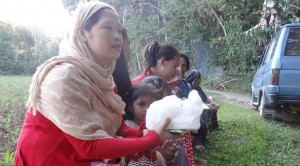Women empowerment brings light to remote community

BABY Mindalano, who barely went to school, has learned Tagalog mainly from listening to radio programs. NASH MAULANA
MADAMBA, Lanao del Sur—In a village where there is neither school nor electricity, a women’s literacy program is empowering their community.
Jamilah Alodino, vice president of Mamisa People’s Organization, said that with less political involvement, the women in Barangay Balagunun here believed they could do better empowering their own people and community with the right tools—education, and being on the track of development through participatory consultation.
Schools close to the Madamba town center are too far to walk to from Balagunun, a village overlooking Lake Lanao from its now concrete section of the lake’s Circumferential Road.
Children have to go 15 kilometers downhill to the nearest primary school in Cabsaran, which explains a prevalent literacy rate of about 10 percent of the barangay’s close to 2,000 residents able to read and write in English, and about that number in Arabic, Alodino said.
Transistor radios get signals from Marawi, Iligan, Ozamiz, Cagayan de Oro and Manila, bringing information and influence.
Article continues after this advertisementIn late 2012, the village’s women, many of them mothers, participated in a survey conducted by facilitators and volunteers trying to determine what the residents needed most to improve their lot.
Article continues after this advertisementBarangay assemblies followed, forming part of social preparations in poor villages in the Autonomous Region in Muslim Mindanao (ARMM) that were mapped earlier for intervention by the World Bank-supported ARMM Social Fund Project (ASFP).
Volunteers and local facilitators translated the residents’ exchanges in assemblies into proposals that were integrated in the barangay development plan, one of the facilitators said.
With the Learning and Livelihood Food Sufficiency (LLFS) program as the residents’ first choice for an all-women educational activity, the ARMM Department of Social Welfare and Development, in partnership with ASFP, designed a three-month training program on basic literacy and numeracy, coupled with livelihood education on household entrepreneurship for female residents.
Literacy also strengthens democracy in Balagunun. After graduating from the LLFS integrative module, 70-year-old Pauli Misug said that in May 2013 and in the more recent barangay elections, she could already read and shade the names of candidates of her choice without assistance.
Suhaimin Cosain said she and fellow LLFS graduates Diamond Diso and Fatima Malangkat had also learned basic numeracy, which they used in small trading activities. She now knows how to add costs of stocks and expenses, and to subtract them from total market sales to determine profit margin.
After graduation, ASFP gave P1,000 to each of the 20 or so beneficiaries to help them establish capital for their organization, or to individually engage in any income-generating activity of choice, ASFP manager Aba Kuaman said.
Alodino said the women’s participation in barangay assembly consultations added weight to the clamor for local development initiatives. Next to learning, the consensus is for the barangay to have a common solar drier and a multipurpose shed for its agricultural products.
“We now have both, and also latrines, and a day-care center, so our grandchildren can no longer experience what we had gone through, failing in our early quest for knowledge,” she said.
Baby Mindalano, an LLFS graduate, said the men among them helped as laborers in the construction work.